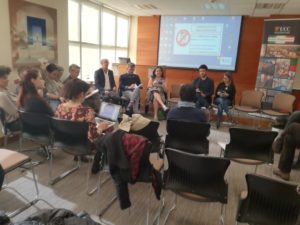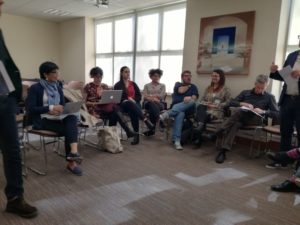 For 11 years the Department of Italian at University College Cork has been the centre for Graduate Studies in Ireland, hosting the annual Graduate Conference in Italian Studies conference. In May 2019, many of the key researchers of the department organized a reformulated event targeted at both ECRs and research postgraduates, consisting of a one-and-a-half day workshop on Methodologies of Theoretical Approaches within the discipline. The guiding principle to the workshop was the application of methodologies and theory to the study of Italian language and cultural production.
For 11 years the Department of Italian at University College Cork has been the centre for Graduate Studies in Ireland, hosting the annual Graduate Conference in Italian Studies conference. In May 2019, many of the key researchers of the department organized a reformulated event targeted at both ECRs and research postgraduates, consisting of a one-and-a-half day workshop on Methodologies of Theoretical Approaches within the discipline. The guiding principle to the workshop was the application of methodologies and theory to the study of Italian language and cultural production.
The workshop was centred on four dedicated sessions, each consisting of a keynote speaker and ECR/PhD presenters. The conference opened with a panel on Spatial Humanities & Geocriticism (organizers: Silvia Ross, UCC/Giovanni Vitali [MSCA European Fellow, UCC]), with keynote Davide Papotti (Università di Parma), who kicked off the session with his talk titled ‘Geografie letterarie e geografie della letteratura: approcci interdisciplinari e casi di studio’. This was followed by presentations by two postdoctoral researchers from UCC: Martina Piperno (IRC Fellow) spoke about ‘Carlo Levi’s Poetic Geography’ and Giovanni Vitali (MSCA European Fellow) presented a paper on ‘La fitta rete d’incastri dell’opera di Vasco Pratolini’. The session concluded with Marzia D’Amico (University of Oxford) on ‘Sara Ventroni, “Nel Gasometro”. A structured poetic obsession for a body structure’.
 The following morning began with a panel on ‘Language Assessment for a New Generation of Language Learners: The Cyber-Learners’ with keynote speaker Lucilla Lopriore (Università degli Studi Roma Tre) on ‘More than meets the ears. New perspectives in aural comprehension processes and evaluation in plurilingual and multimodal contexts’. The other talks were given by the session organizers, Gabriella Caponi (UCC), on ‘Digital Literacy. What has changed in the Language Policy of the Council of Europe?’ and Sara Lis Ventura (UCC), ‘Student-Created Podcasts as an Assessment and Learning Tool for Advanced Italian Learners.’
The following morning began with a panel on ‘Language Assessment for a New Generation of Language Learners: The Cyber-Learners’ with keynote speaker Lucilla Lopriore (Università degli Studi Roma Tre) on ‘More than meets the ears. New perspectives in aural comprehension processes and evaluation in plurilingual and multimodal contexts’. The other talks were given by the session organizers, Gabriella Caponi (UCC), on ‘Digital Literacy. What has changed in the Language Policy of the Council of Europe?’ and Sara Lis Ventura (UCC), ‘Student-Created Podcasts as an Assessment and Learning Tool for Advanced Italian Learners.’
This was followed by a panel on ‘Postcolonialisms’, organized by Mark Chu and Chiara Giuliani of UCC, featuring Neelam Srivastava (Newcastle University) as keynote, who spoke on ‘Postcolonial Theory as Italian Theory? The Characteristics and Anomalies of Italian Colonialism and Anti-Colonialism’. This was followed by Erica Bellia (University of Cambridge), with her talk on ‘Thinking Allegorically. A Postcolonial Reading of Italian Industrial Literature?’ and Chiara Giuliani on ‘Maps of belonging: cartographies in Italian postcolonial literature’.
The last session, on ‘Authorship and Reception’, organized by David Bowe (IRC Postdoctoral Fellow, UCC) and Nicoletta Mandolini (UCC) had Ursula Fanning, University College Dublin as keynote. She spoke on ‘Crossing Boundaries? Theoretical Trajectories, Authorial Approaches.’ Other speakers included Alberica Bazzoni (University of Warwick) on ‘Women Writers Respond. Writing, Gender and the Literary System in Italy Today’, Roberto Binetti (University of Oxford) on ‘A Poetics of Femininity? Towards a Reassessment of Contemporary Italian Women’s Poetry’ and Maria Di Maro (Università di Bari) on ‘An Example of Seventeenth-Century Female Writing: Margherita Costa’. The workshop concluded with a lively Round Table discussion on The Future Critical Paradigms for Italian Studies?, and included a contribution from Deborah Parker (University of Virginia) on diversity in Italian Studies.
Images from the workshop can be viewed on the Italian Department Facebook page: https://www.facebook.com/pg/ItalianUCC/photos/?tab=album&album_id=2389043227806875
For more on the conference activities of the Department of Italian, UCC, see https://www.ucc.ie/en/italian/conferencesexhibitions/
Silvia Ross
University College Cork, Ireland
